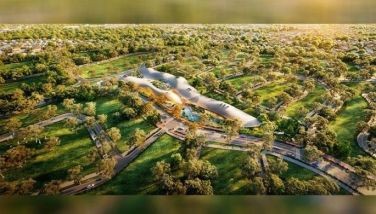Building classrooms

The moral mayhem over the pork-laden 2025 national budget brings up the question of whether we can trust the government to properly invest in the things we need to get our people out of poverty and the country out of a death spiral.
Not only are our officials more inclined to use our taxes to fatten their wallets, when they do build infrastructure like school buildings, the cost is always more than it should be. Sobrang patong for the share of our officials, both national and local.
Years ago, then senator Franklin Drilon signed a P50-million deal with the Federation of Filipino-Chinese Chambers of Commerce and Industry Inc. (FFCCCII) to build cost-effective public-school buildings in the provinces of Benguet, Bulacan, Laguna, Iloilo, Negros Occidental, Cebu, Zamboanga and Davao, among many others.
The project was funded by Drilon’s Priority Development Assistance Fund, a rare good and transparent use of pork barrel funds. Starting in 2002 up to 2011, the Drilon-FFCCCII school-building program had built about 1,400 classrooms all over the country.
Drilon said through his partnership with the private sector, they built cost-effective school buildings that only cost P650,000 per building with two classrooms. That amount would only build one classroom under the DepEd. He called on the Commission on Audit to look into what appears to be a huge disparity between the cost-effective school building program he initiated in partnership with the private sector and that of DepEd.
Last month, former Vice President Leni Robredo inaugurated a two-classroom building at the Morada Ramos Elementary School in Barangay Carolina in Naga City, thanks to Western Guaranty Corp., a generous partner of Angat Buhay foundation. Angat Buhay builds classrooms at a cost of just P800,000 while DepEd classrooms cost between two million and three million pesos.
Question: With more classrooms to build, DepEd/DPWH-built schools should be cheaper. Why are these more expensive?
Early last year, Angat Buhay also inaugurated new classrooms in Naga City, at Julian Meliton Elementary School. A collaborative project with “Aklat, Gabay, Aruga Tungo sa Pag-angat at Pag-asa” (AGAPP) Foundation, Jesus V. Del Rosario Foundation (JVRF) and the Ortoll family. Atty. Robredo also turned over additional classrooms at Mac Mariano Elementary School in Naga City, another collaborative project undertaken by Angat Buhay and the AGAPP Foundation Inc.
It isn’t just Bicol and Naga. Robredo also partnered with JVRF for the construction of new classrooms in Isabela City in Basilan.
Robredo also turned over two school buildings with four classrooms, to replace the old, dilapidated and makeshift classrooms used by almost 150 students of Siba-o Elementary School in Calabanga, Camarines Sur.
It warms the heart to see private citizens going out of their way to build infrastructure that the government can’t seem to build enough of and at a lower cost like the private donors. It is not just school buildings. The government can’t build and manage the expressways that private companies have put up. Airports are better managed by the private sector, as Mactan Cebu and NAIA are showing.
During the PNoy watch, DepEd started to tap the private sector in helping ease the backlog in school buildings though PPP or Public Private Partnership and successfully cleared the school rooms backlog. Duterte discontinued it. But now, DepEd is considering it again.
Education Secretary Sonny Angara recently signed a $1 million Technical Assistance Agreement with the Public-Private Partnership Center to help address a portion of the 165,000-classroom shortage. The agreement provides technical support for the construction of 15,000 classrooms in 2025 in approximately 1,600 schools across nine regions. This initiative is expected to benefit over 600,000 learners nationwide.
This Project Development and Monitoring Facility grant from the PPP Center aims to streamline the planning and implementation of the PPP for School Infrastructure Program Phase III, ensuring a more effective approach to addressing the country’s classroom backlog.
DepEd also has plans to launch follow-up waves of up to 90,000 additional classrooms in total, to help cover the country’s classrooms deficit.
DepEd is also exploring innovative PPP models for other educational facilities, such as bundled campus development, school libraries and other infrastructure. PPPs are a critical component of the reform agenda in basic education, which includes decentralization and digitization.
To maximize the utility of these classrooms as effective learning spaces, DepEd is exploring classroom construction packaged with sustainable energy, internet connectivity, furniture and water systems. The classrooms will also incorporate sustainability and climate resiliency features, including solar panel systems and rainwater catchments, ensuring they meet the needs of future generations.
Given the refusal of Congress to even provide for counterpart funds for foreign assisted projects in the programmed part of the budget, the BBM administration will have to rely more and more on PPP to address the infrastructure gap, a major impediment for development and attracting foreign investors.
Corporate foundations should consider a program that will provide scholarships to the top 10 pupils in every grade level in public elementary schools to supplement government vouchers so they can enroll in private schools that provide better educational outcomes. Private school pupils performed better in the PISA tests than their public school counterparts. The future of intelligent pupils from poor families are better nurtured in this kind of public-private partnership.
If the private sector takes on more of the load, another question arises…where does the money we pay as taxes go? A short answer, more and more of our taxes go into the pockets of the officials we elect for Congress and the LGUs. This is why the moneyed elite and corporations must come forward and provide more and more of the basic services we need in education, among others. Anyway, money spent on such projects are tax deductible and we get to see the money really went to provide a public good.
Boo Chanco’s email address is bchanco@gmail.com. Follow him on X @boochanco
- Latest
- Trending




























